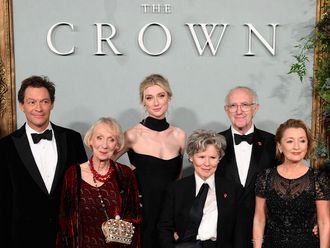The frumious Bandersnatch is a creature that first appears in ‘Through the Looking Glass’, and ‘What Alice Found There’; Lewis Carroll’s 1871 sequel to his gamechanging contribution to children’s literature ‘Alice’s Adventures in Wonderland’. It appears fleetingly as part of Carroll’s most famous shard of nonsense, the Jabberwocky poem, then later as a biting, snapping, whipfast being that lives in the land behind the looking glass.
A gift of a name, therefore, and the only possible title for Netflix’s own gamechanging release — a stand-alone extended episode of ‘Black Mirror’, written by series creator Charlie Brooker and directed by David Slade which allowed the viewer to make decisions for the main character, a video game designer called Stefan in the throes of building a groundbreaking (in 1984) multiple-ending game himself, and affect the outcome of the story.
Some — like which breakfast cereal Stefan should choose — were insignificant, some took you away from the current plotline then looped you back in, and others were literally the difference between life and death.
On the one hand, it was television with responsibility and I wanted to scramble for the hills. Perhaps it’s age, perhaps it’s my non-digital nativism, perhaps it’s simply my temperament but — amid what we can now call the traditional ‘Black Mirror’ ideas of what it means to have free will, the impossibility of privacy, the rapacious appetites of the hydra-headed techbeast, our passive and active complicity in evil, our witless fertilisation of the seeds of our own destruction, and so on — the greatest revelation this episode afforded (I suspect) many of us was of the refuge offered by standard telly. Even the most complex, arresting, emotionally draining show is essentially escapism because all the work is done for us. The story is scripted, acted, filmed and delivered in finished, polished form so we can watch it while we eat our teas, pick our noses or scroll through Twitter.
If ‘Bandersnatch’ does herald a new dawn of interactive programming, I suspect it will find a specific rather than general audience — and as they will be younger, fitter, stronger, more receptive and basically better in every way than us, the race will probably ultimately be to them.
On the other hand — whatever your visceral response to the sudden upending of every convention you depended on for your entertainment and sanity — what a rush Bandersnatch provided. What a feat you felt you were witnessing. What an accomplishment in every practical way. Of course, multiple endings and changed narrative courses are not new, but anyone who equates the Choose Your Own Adventure books (or even something closer to the medium’s mark such as Steven Soderbergh’s Mosaic on HBO) with what Brooker and Netflix have pulled off here is reaching. To marshal the technical and logical resources to provide plausible storylines branching off into five credible ‘main’ endings and an as-yet-unsubstantiated (though innumerable Redditors are working on it) number of lesser variants to deliver a seamless whole whatever choices a viewer takes makes me want to prostrate myself in front of someone or something. Partly in awe, partly in sheer weeping relief that no one will ever force me to work out the maths behind it all.
Perhaps inescapably, most of the energy seemed to have gone into the innovative technical aspects of the event. Taken as an episode of ‘Black Mirror’, it wasn’t the series’ finest hour-plus-however-many-convolutions-you-got-through-before-your-own-brain -started-folding-in-on-itself. It rarely deviated from the expected deviance, rarely landed in an unexpected place or — and this was where it most resembled its videogaming ancestry — had energy to spare to make the characters much more than ciphers.
But these are problems of infancy. A new genre is now here. And it will get better, and more sophisticated and doubtless acquire emotional heft (once actors have overcome the shallowness of affect that must bedevil any performance that has to fit organically with any number of unknown endings) as well as simply stimulating excitement and an appetite for finding out what happens next.
As a viewer, I will wave from the shores of traditional TV, happy to be spoon-fed my entertainment and hoping that the young folk are having fun. And that they are not all nascent tyrants for whom controlling the action along several predetermined pixelated paths of fictional characters will soon not be enough and that they will not one day return, power-crazed and ready to exercise their skills on the big soft lumps they left behind.
___
Don’t miss it
‘Black Mirror: Bandersnatch’ is now streaming on Netflix.













